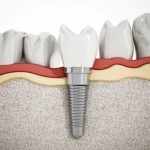Do you sometimes find that your gums bleed after brushing or flossing your teeth? Gums never bleed for no reason. Repeated bleeding is a sign of gum disease, which may be gingivitis or periodontitis.
If your gums bleed frequently, we recommend that you look into it. In this article, our maxillofacial surgeons explain what causes gums to bleed, how to treat the problem and how to prevent it from happening in the first place.
Why do gums bleed?
In most cases, bleeding gums can be remedied by practicing good oral hygiene. However, it’s important to determine the cause of the bleeding, because professional intervention may be necessary in some cases.
Bleeding gums are a fairly common phenomenon, and there are many factors that can cause gums to bleed. Here are the main ones.
Gingivitis
The most common cause of bleeding gums is gingivitis, an inflammation of the gums caused by the accumulation of plaque on or under the gum line.
Although gingivitis itself is benign, it can worsen if left untreated and develop into a more serious oral pathology. Some people are more likely to develop gingivitis than others. Susceptible groups include pregnant people, the elderly and those with braces.
Periodontitis
If gingivitis is not treated promptly, it can develop into periodontitis. Periodontitis is an inflammation that is more serious and painful than gingivitis. It affects the tissues that support the teeth and can cause tooth loss. When the inflammation reaches this stage, it must be treated by a periodontist to prevent the gum infection from worsening further.
Dental abscess
A dental abscess is a buildup of pus that forms as a result of a tooth infection. If bacteria reach the dental pulp, the body can react by developing an abscess, which may cause the gums to bleed. Dental abscess treatment may involve a root canal, antibiotics or drainage.
Brushing incorrectly
Brushing incorrectly can also cause your gums to bleed. You may be brushing too vigorously, moving the brush incorrectly or using the wrong toothbrush.
External factors
The bleeding could also be caused by external factors such as smoking, poor diet or certain medications, particularly blood thinners and those that dry out the mouth or impair the immune system.
It’s always best to consult your dentist or a maxillofacial specialist such as Dr. Lenis to determine what is causing the bleeding.
Bleeding gums: prevention and treatment
Certain habits, like smoking and drinking alcohol, should be avoided in order to prevent the gums from becoming fragile. There are also good practices that can be implemented to strengthen the gums and make them less prone to bleeding.
Practice good oral hygiene to protect your gums
There aren’t innumerable ways to prevent your gums from bleeding. The main way to keep your gums healthy is by practicing good oral hygiene. Here are 3 oral hygiene habits to adopt for healthier gums:
- Brush your teeth two to three times a day and floss daily to prevent tartar and bacteria from building up and affecting your gums.
- Use mouthwash for additional protection against bacteria.
- Buy a good quality toothbrush and replace it every three months. Otherwise, you may irritate your gums with damaged bristles and expose them to the bacteria that accumulates on the brush.
See a dentist if bleeding persists
If the bleeding persists, it’s important to make an appointment with a professional without delay. An oral health specialist will be able to check for periodontal pockets and x-ray your mouth to detect any bone loss.
Do your gums bleed often? See a specialist
If you practice good oral hygiene but find that your gums still bleed frequently, we strongly recommend that you talk to your dentist about it. The bleeding may signal a more serious pathology that requires surgical intervention.
At Clinique MFML, we have the knowledge and expertise to detect and treat a variety of oral pathologies. If you would like to get an opinion from one of our experts, contact us today! Our specialized oral and maxillofacial surgeons will be able to identify and treat any lesions in your mouth and jaw.




